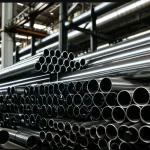Immediate operational changes for UK businesses following Brexit
Brexit has fundamentally altered UK trade and business operations. One of the most immediate impacts has been changes in trade agreements, requiring businesses to adapt to new customs procedures. These updates include the introduction of customs declarations and increased border checks, leading to longer wait times and additional paperwork. For many UK companies, this shift forced a re-evaluation of their logistics and distribution models to maintain efficiency.
The divergence in business regulations post-Brexit has created compliance challenges. UK firms must now navigate two distinct regulatory environments: UK domestic rules and evolving EU standards for goods and services. This divergence means that compliance requirements often double, increasing administrative burden and costs. Sectors heavily reliant on EU rules, such as pharmaceuticals and manufacturing, face greater scrutiny to ensure continued market access.
Also read : Vallourec smart tubular solutions for energy and industry
Cross-border operations have been disrupted initially, with businesses experiencing delays and uncertainties. The changes in UK-EU relations have affected sourcing and delivery schedules, forcing companies to develop contingency plans. Immediate operational responses include enhancing customs expertise in-house and leveraging trade facilitation services to minimize disruption.
Understanding and addressing these operational shifts is critical for UK businesses seeking to stabilize and grow in the post-Brexit landscape.
Have you seen this : Discover vallourec's innovative tubular solutions for energy & industry
Immediate operational changes for UK businesses following Brexit
Brexit has led to significant shifts in UK trade and business regulations, requiring companies to rapidly adjust their operations. One of the earliest and most impactful changes involves new customs procedures. UK businesses now face additional paperwork, including customs declarations and compliance with varied tariff schedules, directly affecting supply chain timing and cost structures.
Regulatory divergence between the UK and EU has introduced fresh compliance challenges. Post-Brexit operations increasingly demand alignment with two separate standards: UK-specific regulations and remaining EU rules for businesses trading across the Channel. This split has complicated product certification, safety testing, and environmental compliance requirements.
The initial disruptions in cross-border business activities were notably pronounced in sectors reliant on seamless EU trade, such as manufacturing and wholesale distribution. Delays at borders, unpredictable inspection schedules, and changes to VAT treatment have created a learning curve, with some businesses reporting inventory shortages and increased administrative overhead.
Understanding the Brexit impact on UK trade means recognizing that the operational adjustments are ongoing, with many companies still adapting to evolving regulatory frameworks and shifting UK-EU relations. Establishing clear internal compliance teams and investing in customs expertise have become essential strategies for maintaining business continuity in this new landscape.
Trade and market access adjustments
Following Brexit, UK businesses face a transformed landscape of UK-EU trade barriers. The introduction of new tariffs and non-tariff barriers has complicated market access post-Brexit, raising costs and causing delays for companies trading with EU partners. These hurdles include increased customs checks and regulatory scrutiny, which particularly affect sectors like manufacturing and services that rely heavily on smooth cross-border exchange.
Importantly, import/export challenges have emerged due to the UK now being treated as a third country by the EU. This status requires UK firms to comply with both UK and EU import regulations, doubling paperwork and compliance demands. For example, manufacturers sourcing components from the EU must navigate additional documentation, causing production slowdowns and inventory management issues.
Adjustments to EU market access also involve exploring third-country trade deals and new markets outside the EU. Businesses are recalibrating supply chains and negotiating with partners to mitigate delays and costs. For service sectors, regulatory equivalence uncertainties create obstacles to seamless operation within the EU. Therefore, UK companies must adopt flexible strategies, such as diversifying markets and investing in knowledge of customs procedures, to maintain competitiveness in a complex post-Brexit trade environment.
Immediate operational changes for UK businesses following Brexit
Brexit’s impact on UK trade has forced businesses to navigate new customs procedures that add complexity and delay. The introduction of customs declarations and border checks means companies must manage extra paperwork and longer processing times, directly influencing operational efficiency. Many firms have responded by enhancing their customs expertise to cope with these demands.
The divergence in business regulations post-Brexit has created dual compliance landscapes. UK companies now reconcile UK-specific rules with ongoing EU regulations, particularly when dealing with cross-border trade. This has heightened the administrative burden, especially in sectors requiring rigorous product certification and safety testing, magnifying costs and operational complexity.
Initial disruptions in post-Brexit operations were marked by delays and uncertainty, notably in supply and delivery schedules. Border hold-ups and changing VAT treatments have disrupted inventory management, compelling businesses to revise stock control and logistics plans. These operational shifts underline the evolving nature of UK-EU relations, requiring firms to remain agile and invest continuously in compliance and customs processes to maintain seamless trade flows.
Immediate operational changes for UK businesses following Brexit
The Brexit impact on UK trade has led to swift operational shifts for businesses navigating new customs procedures. Companies now contend with heightened paperwork demands, including detailed customs declarations required for every shipment crossing the UK-EU border. This change alone has lengthened supply chain timelines and increased operational costs. Firms must allocate resources to manage these declarations accurately to avoid border delays.
Regulatory divergence remains a key challenge. Businesses engaged in post-Brexit operations must comply with distinct UK and EU regulations simultaneously. This split complicates processes such as product certification and safety standards compliance. For example, goods that previously adhered to a single EU standard must now meet UK-specific requirements alongside EU standards for exports, doubling compliance efforts.
The immediate disruption to cross-border business activities included unpredictable border inspections and altered VAT treatments, causing operational uncertainty. Many companies responded by creating dedicated customs teams or outsourcing to experts to navigate evolving UK-EU relations effectively. These changes highlight how deeply Brexit has reshaped operational frameworks, pressing businesses to adapt rapidly or risk interruptions.
Immediate operational changes for UK businesses following Brexit
Brexit has brought profound shifts in trade agreements and introduced new customs procedures that UK businesses must rapidly navigate. Companies now face detailed customs declarations and stricter border checks, which add layers of complexity to everyday operations and extend supply chain timelines. This requires firms to enhance internal customs expertise and invest in training to manage these new processes efficiently.
The divergence in business regulations between the UK and EU has led to dual compliance demands. Companies must now meet separate standards for product safety, certification, and environmental rules, depending on whether goods are destined for domestic or EU markets. This regulatory split increases compliance workloads and costs, especially for sectors like manufacturing and pharmaceuticals with stringent requirements.
Brexit’s impact on post-Brexit operations has been most apparent through initial disruptions in cross-border activities. Delays at ports and new VAT treatments have challenged inventory management and logistics planning. The evolving nature of UK-EU relations calls for ongoing agility, with businesses adapting to dynamic regulatory frameworks and maintaining strong customs capabilities to ensure operational continuity and minimise trade friction.
Immediate operational changes for UK businesses following Brexit
Brexit’s impact on UK businesses has necessitated rapid adaptation to new trade agreements and customs procedures. Companies now face complex requirements such as detailed customs declarations for every shipment crossing the UK-EU border. This alteration lengthens supply chains and increases operational costs. The Brexit impact on UK trade has made these procedural demands unavoidable, forcing businesses to develop specialist customs expertise or outsource to specialists to ensure timely and compliant border crossings.
The regulatory divergence between the UK and EU significantly complicates compliance. Businesses engaged in post-Brexit operations must satisfy both UK-specific rules and EU regulations for products traded internationally. This split doubles certification, testing, and documentation efforts, increasing administrative burdens across sectors, especially manufacturing and pharmaceuticals.
Initial disruptions to cross-border business activities appeared as unpredictable inspections, customs delays, and changing VAT treatments. These issues have directly affected inventory levels and delivery schedules, prompting companies to revise logistics strategies continuously. Managing these ongoing uncertainties in UK-EU relations requires firms to remain agile and invest persistently in compliance frameworks and customs management.
Immediate operational changes for UK businesses following Brexit
Brexit has triggered profound shifts in trade agreements and customs procedures that UK businesses must rapidly address. The introduction of detailed customs declarations and stricter border controls means firms face increased complexity in their post-Brexit operations. These requirements extend supply chain timelines and add administrative burdens that necessitate enhanced internal expertise or outsourcing of customs management.
The regulatory divergence between UK and EU regulations compounds these operational challenges. Businesses must comply with two separate sets of business regulations, affecting product certification, safety standards, and environmental compliance. This dual regulatory compliance increases costs and complicates workflows, especially for sectors like pharmaceuticals and manufacturing, where adherence to rigorous standards remains critical for both domestic and EU markets.
Initial disruptions in cross-border business activities have been marked by delays and unpredictability at customs checkpoints. Changes to VAT treatment and inspection schedules have forced companies to revise inventory and logistics planning, highlighting the dynamic nature of evolving UK-EU relations. To maintain continuity, many firms have invested in dedicated customs expertise and developed agile processes to adapt rapidly to ongoing regulatory and operational changes.
Immediate operational changes for UK businesses following Brexit
Brexit’s impact on UK trade has triggered profound shifts in trade agreements and customs procedures. UK businesses now contend with comprehensive customs declarations and more stringent border checks. These changes directly extend supply chain timelines and raise operational costs. Companies must allocate resources to ensure accurate documentation, reducing the risk of delays that can disrupt delivery schedules and inventory management.
The divergence in business regulations between the UK and EU intensifies compliance complexity. Firms engaged in post-Brexit operations face dual regulatory landscapes, requiring adherence to both UK-specific standards and continuing EU rules. This split doubles efforts for product certification, safety testing, and environmental compliance. Such regulatory divergence elevates administrative workload and exposes companies to higher compliance risks.
Early disruptions in cross-border business activities were marked by unpredictable border inspections and altered VAT treatments. These challenges complicated operational planning and heightened uncertainty in UK-EU relations. Businesses responded by enhancing customs expertise, establishing dedicated compliance teams, or outsourcing specialist services. Continuous adaptation to evolving regulations and operational demands remains essential for sustaining seamless trade flows and mitigating Brexit-induced frictions.
Immediate operational changes for UK businesses following Brexit
Brexit’s impact on UK businesses introduced urgent operational shifts, predominantly due to shifts in trade agreements and customs procedures. The need for detailed customs declarations and additional border checks has become routine, increasing shipment processing times and administrative workload. This procedural complexity means companies are investing heavily in developing internal customs expertise or partnering with specialist agents to mitigate delays.
Simultaneously, the regulatory divergence between the UK and EU has profoundly affected compliance demands. Businesses must now simultaneously adhere to two sets of business regulations: UK-specific standards and continued EU rules for exports. This division complicates product certification, safety testing, and environmental compliance, essentially doubling the administrative and operational tasks required for market access.
The consequences of these changes were evident in early post-Brexit operations, with significant disruptions in cross-border business activities. Delays at customs, unexpected inspections, and altered VAT treatments created operational uncertainty, forcing firms to adapt logistics strategies rapidly. Monitoring evolving UK-EU relations remains critical, as adjustments in trade policy or regulation continue to influence operational frameworks. Companies maintaining agility through dedicated customs teams and compliance processes are better placed to navigate this dynamic landscape effectively.
Immediate operational changes for UK businesses following Brexit
Brexit’s impact on UK trade immediately introduced significant shifts in trade agreements and customs procedures. UK businesses must now manage detailed customs declarations and heightened border controls, directly affecting supply chain timelines and operational efficiency. These changes impose additional administrative workload, requiring firms to bolster customs expertise or hire specialists to navigate the evolving requirements effectively.
The regulatory divergence between UK and EU has complicated compliance. Companies engaged in post-Brexit operations face dual regulatory landscapes, needing to satisfy both UK-specific rules and ongoing EU regulations. This split demands duplicate efforts in product certification, safety testing, and environmental compliance. For example, goods destined for both markets must undergo separate conformity assessments, leading to increased costs and administrative burden.
Initial disruptions in cross-border business activities manifested as unpredictable customs inspections, delays, and alterations in VAT treatments. These challenges disrupted inventory management and delivery schedules, forcing businesses to revise logistics plans constantly. The shifting nature of UK-EU relations means firms must remain agile, investing persistently in compliance frameworks and customs capabilities to minimise trade friction and sustain operational continuity in this complex landscape.
Immediate operational changes for UK businesses following Brexit
Brexit’s impact on UK trade has mandated rapid adjustments to trade agreements and customs procedures, reshaping post-Brexit operations at a fundamental level. UK firms now navigate comprehensive customs declarations and stricter border checks, which extend supply chain timelines and elevate operational costs. This difficulty requires businesses to bolster internal expertise or rely on specialized customs agents to ensure compliance and prevent shipment delays.
The divergence in business regulations between the UK and EU compounds these operational challenges. Companies face dual frameworks, simultaneously adhering to UK-specific rules and ongoing EU regulations. This regulatory split increases complexity in product certification, safety testing, and environmental compliance, particularly impacting sectors like manufacturing and pharmaceuticals where standards are stringent. Such dual compliance not only doubles administrative workloads but also raises the risk of non-compliance penalties.
Early cross-border business activities experienced marked disruptions. Unpredictable inspections, altered VAT treatments, and customs delays contributed to inventory disruptions and logistical uncertainties. These operational challenges highlight the evolving nature of UK-EU relations, requiring firms to continually adapt strategies and maintain dedicated compliance teams. Businesses that invest in customs expertise and agile operational processes position themselves to navigate this dynamic regulatory landscape effectively.







